by Thierry Meyssan
VOLTAIRE NETWORK | DAMASCUS (SYRIA) | 20 JUNE 2016
DEUTSCH ESPAÑOL FRANÇAIS РУССКИЙ

In 2011, when the war in Syria was just beginning , a blog appeared under the name of «Gay Girl in Damascus». The author wrote of her life as a free woman in the Syrian capital, and criticised the «Bachar régime». In December, a message was posted on the blog by one of her cousins affirming that the young woman had just been arrested by the «Mukhabarat» (Special Branch). Western gay associations – who know nothing about Syria - mobilised against the «dictatorship ». We learned later that the young woman had never existed. The blog was in reality managed for propaganda purposes by Tom MacMaster (photo) from Edinburgh University, probably for MI6.
In any case, the massacre of homosexuals is not the prerogative of Daesh alone, it is a practice of numerous sectarian groups who claim to be followers of various religions, and more particularly that of Islamist groups. It was the case, for example, of the Lord’s Resistance Army in Uganda in the ’90’s, who claimed to follow Jesus - or today the djihadists, who claim to follow Muhammad. More generally, a large number of Jews, Christians and Muslims consider that sexual activity between people of the same sex is a «sin», while admitting that you do not choose who you fall in love with.
From an ethnological point of view, the condemnation of homosexuality in the name of these religions is concomitant with a view of a society in which men dominate women. It does not exist in societies where individuals are equal in rights.
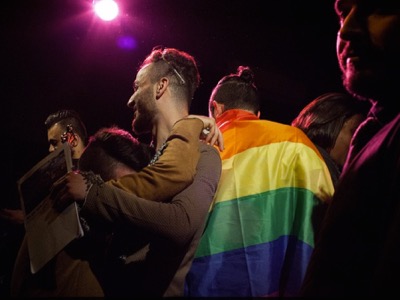
The election of «Mister Gay Syria » 2016 was organised by Subhi Nahas during the month of May in Istanbul, and not Deir ez-Zor. A Schengen visa was refused to the winner, who will therefore be unable to compete in the election of « Mister Gay World» in Malta.
© Bradley Secker / Daily Mail
Daesh and the Baath party – two conceptions of society
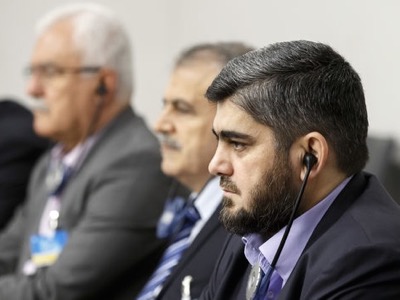
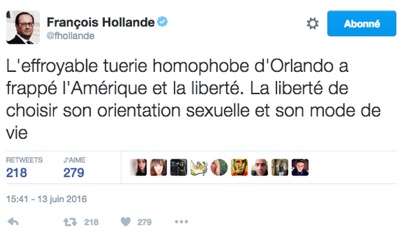
On the 13 June, François Hollande shared a Tweet : «The horrifying homophobic massacre of Orlando has struck at both America and freedom. The freedom to choose one’s sexual orientation and one’s life-style». The French President does not conceive that it is possible to «fall in love» with a person of the same sex – for him, it’s a question of «choice».
It should be noted here that contrary to an image that has been imposed without ever having been discussed, the Syrian Arab Republic has never persecuted anyone for motives concerning their private life. All crimes, real or imaginary, that have been attributed to the Republic are exclusively linked to the repression of Islamists, whether the Muslim Brotherhood or more recently their extensions, al-Qaïda and Daesh. Last February, the Lebanese daily L’Orient-Le Jour, financed by the European Union, and known for its systematic anti-Syrian stance, dedicated a series of articles to a comparison between gay life in Lebanon and in Syria. In Lebanon, the police arrest young people, who have often been denounced by their family, ferret through their portable telephones looking for compromising photographs, summon their friends, oblige all suspects to submit to a medical examination supposed to determine the dilation of their anus, and beat them until one of them accuses the others. However, in Syria, observes the newspaper, «under the régime of Bachar el-Assad, the gay community was enjoying a peaceful existence.» [2].
Syrians do not consider the question of homosexuality from the angle of tolerance or intolerance, but from the angle of privacy. Thousands of years of civilisation have taught them that they can only survive in this region of the world by living together, and they can only manage that by respecting the private life of each and all. It is therefore possible to declare one’s disgust for homosexuals in general while at the same time refusing to accuse anyone in particular of being gay.
Even though the dispositions of the Code Pénal of 1949 have not been repealed, the party of President Bachar el-Assad, the Baath, has developed a form of culture almost unique in an Arab country, based on the respect for differences. So that L’Orient-Le Jour was astounded to hear a gay Syrian refugee describe his period of military service as having been «the most wonderful years of my life», and tell tales of «the parties in reception halls rented by gay couples to celebrate their union». It was only when Daesh arrived that he was obliged to «hide his pink and yellow pants and practice walking in a more masculine way».
Although the founders of the Baath party were inspired first by the French Revolution, their ideology is above all the fruit of the Syrian culture. And contrary to other Arab countries, Syria has a long tradition of respect for different life-styles.
The Biblical religions and sexuality
Judaïsm was founded in the kingdom of Jerusalem. Christianity by Paul of Tarsus in Damascus. Islam was given to Muammad in Arabia, but theQur’an was not written until twenty years after his death, under the authority of the third Caliph, Othmân, in Damascus. In other words, the three Biblical religions were created in geographical Syria.
Three passages of the Torah explicitly evoke homosexuality. According to Leviticus - «You shall not lie with a man as one lies with a woman. This is an abomination.» (18:22) and «The man who lies with a man as one lies with a woman - it is an abomination committed by them both - they should both die, and may their blood fall upon them» (20:13). Finally, in Deuteronomy - «Let there be no prostitutes among the women of Israël, and let no son of Israël prostitute himself in infamy » (23:17).
Replaced in their context, the first two verses are rooted in the patriarchal conception of the tribes of the time, and the third is a condemnation of the sacred prostitution practiced in the temples of other tribes, and thus assimilated with idolatry. Today, the Jews reinterpret their religion by abandoning their tribal aspects, and have no difficulty integrating homosexuals. They often understand the relationship between Ruth and Naomi, and that between King David and Jonathan, as homosexual relations. However, the people who claim to follow the Alliance of God with none but the Tribes of Israël persist in seeing homosexuality as an «abomination». Thus, the state of Israël integrates homosexuals, but the Levaha group protests every year against the Gay Pride and, in 2005, an ultraorthodox Jew stabbed six gays during the parade.
According to the Gospels, Jesus of Nazareth continually criticised the taboos and the formalism of antique Judaïsm, although he never criticised Roman paganism. He promoted a form of spirituality founded on love and sacrifice, and never spoke about sexuality. There is therefore no scriptural foundation for the condemnations of homosexuality by the Christian churches.
The first Christians were divided into two distinct groups. The Jews who considered that Jesus was their Messiah, and the Gentiles (the pagans) who saw him as an example of the perfect man. The former group was organised in Jerusalem around James, «the brother of Jesus», while the latter group was organised in Damascus and Antioch. The former refused to celebrate Mass with the latter, who, as goyim, were «impure» in their eyes. The first group was decimated during the Roman repression of Jerusalem, and only the second group survived.
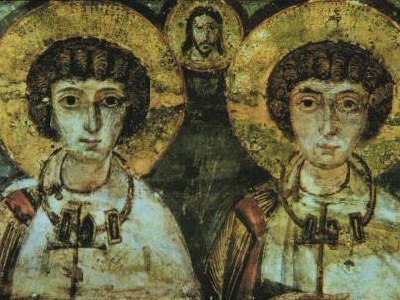
Saint Sergius (or Sarkis in Arab) and Saint Bacchus are considered in the Levant as examples for Christians. Theirs is the only case of a couple being canonised, an honour which has not been recognised for married couples.
It was only from the 11th century, and especially with the Counter-Reformation, that Christians condemned homosexuality. At that time, Rome re-adopted the Vitalist philosophy dating from the end of the Roman Empire, for which the function of sexuality is the reproduction of the species. Western Christians justified this reversal by basing themselves on Paul’s epistles to the Corinthians (VI:9-10) and to theRomans (I:26-28), even returning to Leviticus and Deuteronomy. But apart from the fact that these texts probably have a different meaning, they do not have the authority of Christ. In any case, the integration of homosexuals continued in the Christian communities of the Levant until the 18th century.

In September 2015, Daesh executed persons accused of homosexuality at Haritan (Aleppo) by throwing them from the roofs of building. One of the victims was 15 years old.
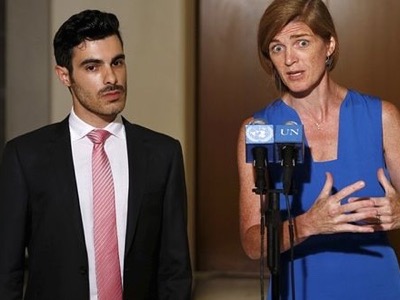
During the meeting of the Security Council on the 24 August 2015, the permanent representative of the United States, Samantha Power, requested the audition of Subhi Nahas, the leader of a Syrian gay organisation presently exiled in Turkey. The young man described the horrors commmitted by Daesh. But to the ambassador’s great deception, he explained that he had fled the country in order to escape from the jihadists, and refused to condemn the Syrian Arab Republic.
Who is comfortable with homosexuality?
Nonetheless, several members of the Council hesitated to condemn these exactions by the jihadists. Angola (80 % Christian) and Chad (mostly Muslim) asked their ambassadors not to participate in the meeting, while other members of the Council demanded a closed session, so that there would be no written report of the meeting, and the Council would abstain from any public conclusion.
As a result, we do not know if it examined only the exactions committed by Daesh, or if it extended its investigations to other jihadist groups. In September 2013, the al-Nusra Front (al-Qaïda), supervised by Turkish and French officers, attempted to take the small town of Ma’loula (40 kilometres from Damascus). The objective had no strategic or even tactical value, but is a powerful symbol for Christians of the Orient. It is the world’s oldest Christian city, converted in the year 35 by Paul of Tarsus and Saint Thecla. Ma’loula claims to conserve the tradition of original Christianity, independent of the schism between Catholic and Orthodox. The jihadists made ferocious attacks on all representations of Christianity, particularly against the grand statue of the Virgin Mary (although she is celebrated by the Qur’an), the relics of Saint Thecla, (whom Catholics no longer recognise as a saint, since she gave the sacrements as a man, but whom Orthodox Christians consider as the thirteenth apostle), and the two monasteries of Saint Sarkis and Saint Bacchus. The Catholic and Orthodox churches, who supported the inhabitants of Ma’loula, were very careful not to mention this aspect of the events.
Finally, the Western powers do not seem to be particularly sincere about their integration of homosexuals. They have made a symbol of free societies, and manipulate the subjet to hammer home the idea that the Syrian Arab Republic is a repressive régime. But the propaganda campaign of the «Gay Girl in Damascus», like the attempt to manipulate Subhi Nahas, has failed. However, they had no problem with supporting al-Qaïda when it attacked the monasteries of Saint Sarkis and Saint Bacchus, or Mohammed Allouche while he was throwing gays from the rooftops.
Thierry Meyssan
Translation
Pete Kimberley
[1] « La CIA dépassée par le soutien de civils à Daesh », par Thierry Meyssan,Réseau Voltaire, 16 mars 2015.
[2] « J’ai caché mes pantalons roses et jaunes, et je me suis entraîné à marcher d’une façon masculine », Chérine Yazbeck, L’Orient-Le Jour, 8 février 2016.






No comments:
Post a Comment